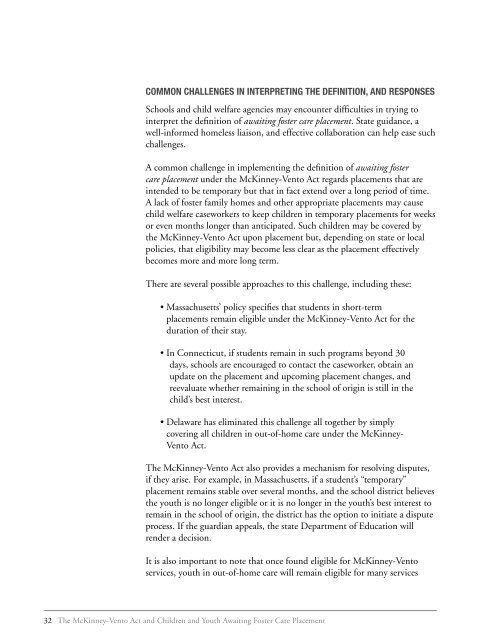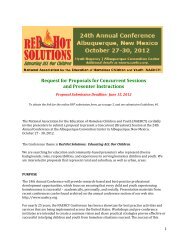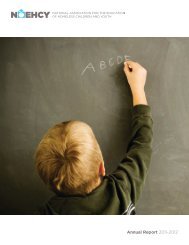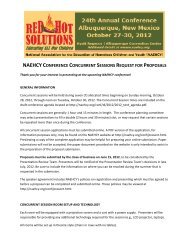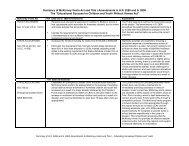The McKinney-Vento Act and Children and Youth ... - State of Michigan
The McKinney-Vento Act and Children and Youth ... - State of Michigan
The McKinney-Vento Act and Children and Youth ... - State of Michigan
Create successful ePaper yourself
Turn your PDF publications into a flip-book with our unique Google optimized e-Paper software.
COMMON CHALLENGES IN INTERPRETING THE DEFINITION, AND RESPONSES<br />
Schools <strong>and</strong> child welfare agencies may encounter difficulties in trying to<br />
interpret the definition <strong>of</strong> awaiting foster care placement. <strong>State</strong> guidance, a<br />
well-informed homeless liaison, <strong>and</strong> effective collaboration can help ease such<br />
challenges.<br />
A common challenge in implementing the definition <strong>of</strong> awaiting foster<br />
care placement under the <strong>McKinney</strong>-<strong>Vento</strong> <strong>Act</strong> regards placements that are<br />
intended to be temporary but that in fact extend over a long period <strong>of</strong> time.<br />
A lack <strong>of</strong> foster family homes <strong>and</strong> other appropriate placements may cause<br />
child welfare caseworkers to keep children in temporary placements for weeks<br />
or even months longer than anticipated. Such children may be covered by<br />
the <strong>McKinney</strong>-<strong>Vento</strong> <strong>Act</strong> upon placement but, depending on state or local<br />
policies, that eligibility may become less clear as the placement effectively<br />
becomes more <strong>and</strong> more long term.<br />
<strong>The</strong>re are several possible approaches to this challenge, including these:<br />
• Massachusetts’ policy specifies that students in short-term<br />
placements remain eligible under the <strong>McKinney</strong>-<strong>Vento</strong> <strong>Act</strong> for the<br />
duration <strong>of</strong> their stay.<br />
• I n Connecticut, if students remain in such programs beyond 30<br />
days, schools are encouraged to contact the caseworker, obtain an<br />
update on the placement <strong>and</strong> upcoming placement changes, <strong>and</strong><br />
reevaluate whether remaining in the school <strong>of</strong> origin is still in the<br />
child’s best interest.<br />
• Delaware has eliminated this challenge all together by simply<br />
covering all children in out-<strong>of</strong>-home care under the <strong>McKinney</strong>-<br />
<strong>Vento</strong> <strong>Act</strong>.<br />
<strong>The</strong> <strong>McKinney</strong>-<strong>Vento</strong> <strong>Act</strong> also provides a mechanism for resolving disputes,<br />
if they arise. For example, in Massachusetts, if a student’s “temporary”<br />
placement remains stable over several months, <strong>and</strong> the school district believes<br />
the youth is no longer eligible or it is no longer in the youth’s best interest to<br />
remain in the school <strong>of</strong> origin, the district has the option to initiate a dispute<br />
process. If the guardian appeals, the state Department <strong>of</strong> Education will<br />
render a decision.<br />
It is also important to note that once found eligible for <strong>McKinney</strong>-<strong>Vento</strong><br />
services, youth in out-<strong>of</strong>-home care will remain eligible for many services<br />
32 <strong>The</strong> <strong>McKinney</strong>-<strong>Vento</strong> <strong>Act</strong> <strong>and</strong> <strong>Children</strong> <strong>and</strong> <strong>Youth</strong> Awaiting Foster Care Placement


